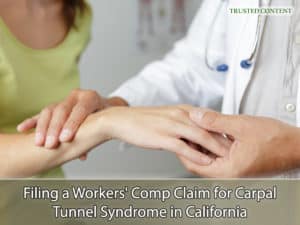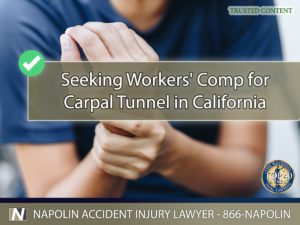Seeking Workers’ Compensation for Carpal Tunnel Syndrome in California
In the bustling work environments of California, carpal tunnel syndrome (CTS) emerges as a prevalent issue affecting a wide array of professions, from technology to manufacturing. This condition, characterized by pain, numbness, and tingling in the hands and arms, is a result of pressure on the median nerve within the wrist. Given its potential to significantly impair daily functioning and job performance, understanding the nuances of California workers' compensation law becomes paramount for affected workers. This comprehensive guide aims to navigate the complexities of claiming compensation for CTS, ensuring that sufferers are well-informed about their rights and the legal avenues available for support and recovery.
Legal Framework for Carpal Tunnel Syndrome in California
California's Workers' Compensation Law
California stands out for its robust workers' compensation system, designed to provide relief and support to workers injured on the job or afflicted by job-related illnesses. For conditions like CTS, which are often the result of repetitive stress and strain, the state’s workers' compensation law offers a lifeline, allowing for medical treatment, income replacement, and necessary accommodations or rehabilitation.
Recognition of Cumulative Trauma
Significantly, California law recognizes cumulative trauma disorders, like CTS, as compensable conditions. This acknowledgment is crucial, as it broadens the scope of protection to include injuries that develop over time, rather than from a single incident. For workers, this means that the repetitive actions inherent to their job roles—whether typing, assembly line work, or any task involving recurrent wrist movement—can form a legitimate basis for a compensation claim.

Recognizing the Symptoms of Carpal Tunnel and Getting a Diagnosis
Recognizing the Symptoms of Carpal Tunnel and Getting a Diagnosis
Identifying Symptoms
The journey to addressing CTS begins with recognizing its early signs, which may start as a mild inconvenience but can progress to severe impairment. Symptoms often manifest as a burning sensation, discomfort, or loss of sensation in the fingers, hands, and forearm, potentially disrupting sleep and daily activities. Early detection and intervention are key to preventing long-term damage.
The Importance of Medical Diagnosis
Securing a medical diagnosis is a pivotal step in the process, serving not only to confirm the presence of CTS but also to establish a direct link to one's occupational activities. Diagnostic methods include physical examinations, nerve conduction studies, and imaging tests that collectively help pinpoint the severity and probable cause of the syndrome. A formal diagnosis is indispensable for validating a workers' compensation claim, providing concrete evidence of the injury’s work-related nature.
Understanding Carpal Tunnel Syndrome
Definition and Causes
CTS is defined by the compression of the median nerve as it travels through the carpal tunnel in the wrist. This nerve compression is frequently a consequence of repetitive motions or sustained positions that increase pressure within the tunnel, leading to the syndrome's characteristic symptoms. Certain workplace conditions and tasks significantly elevate the risk, underscoring the need for ergonomic interventions and preventive measures.
Statistics and Relevance in California
The prevalence of CTS in California reflects broader occupational health challenges, with thousands of workers annually reporting symptoms. The state's diverse economy, encompassing sectors known for repetitive motion tasks, places a considerable portion of its workforce at risk.

Filing a Workers' Comp Claim for Carpal Tunnel Syndrome in California
Filing a Workers' Comp Claim for Carpal Tunnel Syndrome in California
Documentation and Medical Evidence
Compiling comprehensive medical documentation is crucial in substantiating a claim for CTS. This includes detailed records of medical visits, diagnoses, treatment plans, and any work-related assessments that demonstrate the injury’s impact on job performance. Such documentation not only supports the claim but also aids in determining the appropriate level of benefits.
Employer Notification
Timely notification of the employer is a mandated step following the diagnosis of a work-related condition like CTS. California law specifies a window within which this notification must occur, making it critical for employees to act promptly. This formal notification triggers the workers' compensation claims process, laying the groundwork for subsequent legal and medical evaluations.
Step-by-Step Guide to Claims
Navigating the workers' compensation claims process in California requires a clear understanding of the steps involved. From initial reporting to the employer to the final resolution of the claim, each phase is governed by specific regulations and deadlines. Understanding these procedural requirements is essential for ensuring that claims are filed accurately and efficiently, maximizing the likelihood of a favorable outcome.
Treatment and Compensation for Carpal Tunnel Syndrome
Compensation Benefits
Under California’s workers' compensation program, individuals diagnosed with CTS are entitled to various benefits. These may include coverage for medical expenses related to the condition, compensation for lost wages during recovery, and potential disability benefits if long-term impairment is evident. Navigating these benefits requires a thorough understanding of one's rights and the extent of coverage under the law.
Available Treatments
The treatment landscape for CTS ranges from non-invasive options like splinting and physical therapy to more intensive interventions, such as steroid injections or surgery. The choice of treatment depends on the severity of the condition and its impact on the individual's daily life and work. Workers' compensation benefits play a critical role in providing access to these necessary treatments, ensuring that affected workers can achieve the best possible recovery and return to work.
Challenges and Considerations in CTS Claims
Common Challenges
Filing a claim for CTS can be met with various challenges, including disputes over the condition’s work-relatedness or the adequacy of provided medical evidence. Claimants may face skepticism regarding the severity of their symptoms or the necessity of certain treatments. Overcoming these challenges often requires a strategic approach, including comprehensive documentation and, in some cases, legal advocacy.
The Value of Legal Representation
The complexities of the workers' compensation system and the potential for disputed claims make the role of legal representation critically important. An experienced attorney can provide invaluable guidance through the claims process, advocating on behalf of the claimant to ensure that their rights are protected and that they receive the full spectrum of benefits to which they are entitled. Legal expertise is particularly beneficial in navigating appeals, mediations, or hearings that may arise from contested claims.

Seeking Workers' Compensation for Carpal Tunnel Syndrome in California
Seeking Workers' Compensation for Carpal Tunnel Syndrome in California
Carpal tunnel syndrome represents a significant occupational health issue within California, underscoring the importance of informed action and legal support for affected workers. By understanding the intricacies of the workers' compensation claims process and seeking appropriate medical and legal assistance, individuals suffering from CTS can secure the support necessary for recovery and return to work. For those navigating the complexities of a CTS claim, reaching out for a free consultation from Napolin Accident Injury Lawyer at (866)-NAPOLIN offers a vital first step toward understanding and exercising their rights under California law.
- Understanding Uber Accidents and Insurance Coverage Periods in California - April 8, 2025
- A Guide on Red Light Auto Accidents in California - August 14, 2024
- Self-Representing in a California Personal Injury Claim - August 13, 2024
